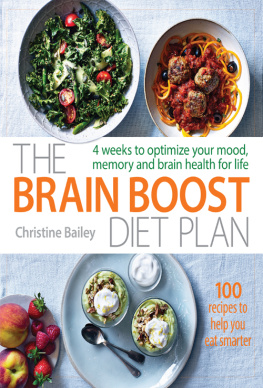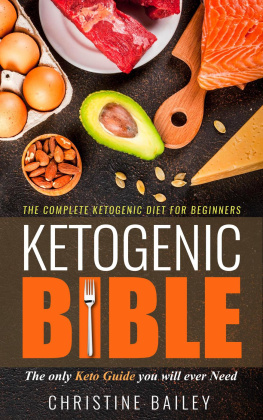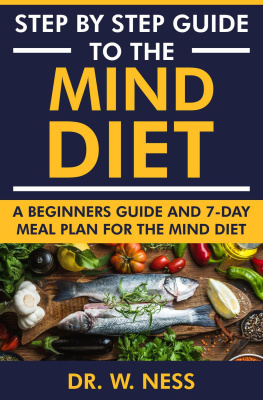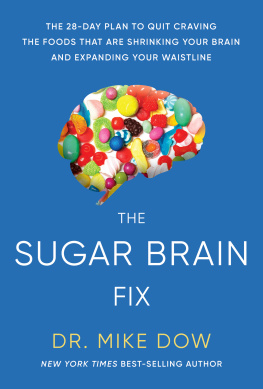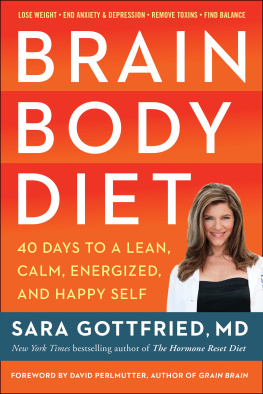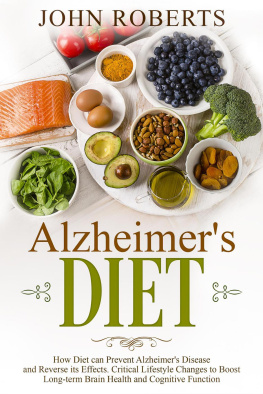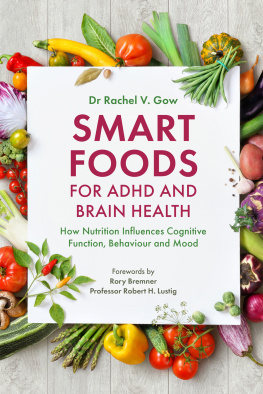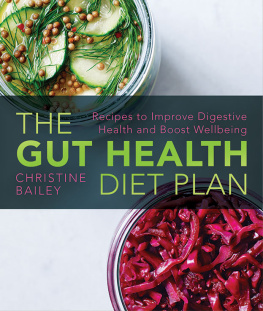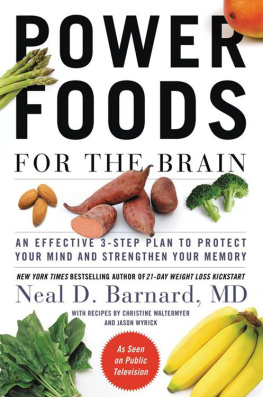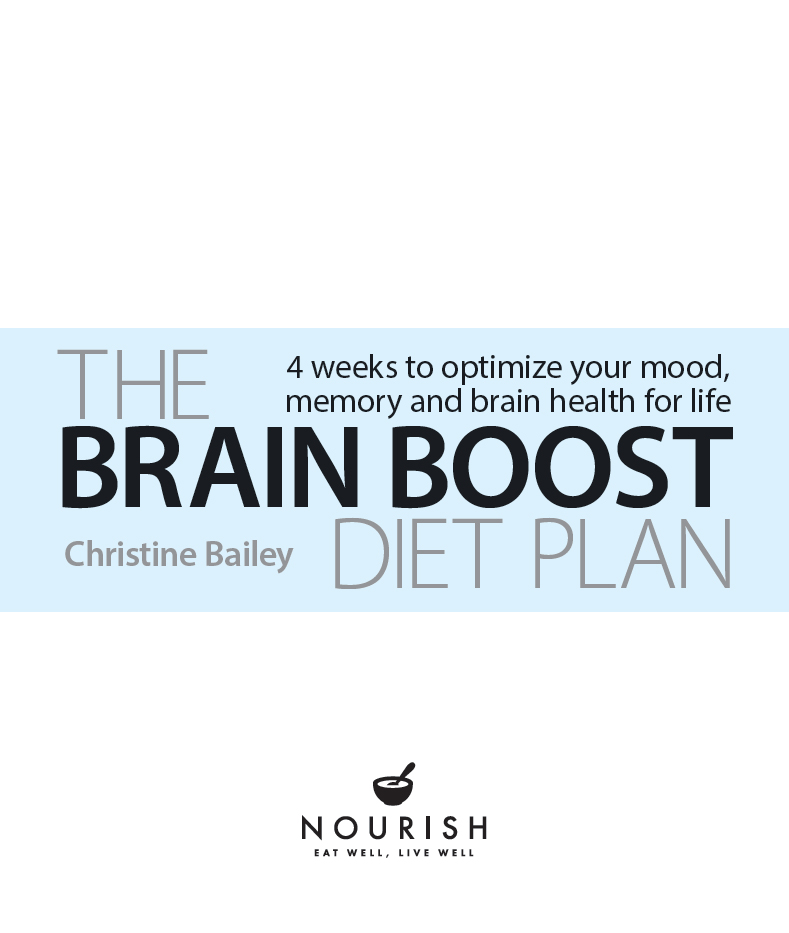THE
BRAIN BOOST
DIET PLAN
CONTENTS
Hows your brain health?
Are you worried about losing your memory? Do you find it hard to concentrate and focus on tasks? Do you struggle with brain fog, low mood or depression? If so, now is the time to take action. Our modern diet and lifestyle can take its toll on the brain. Degeneration can affect people of all ages, and begins decades before symptoms become evident.
Our mood, our memory and our ability to think clearly are all very much dependent on the functioning of our brain cells and the production of brain chemicals. A decline in mental ability, mood or capacity for learning is not inevitable as we age, however. Our brain can actually thrive at any age through specific dietary choices and lifestyle habits.
The Brain Boost Diet will show you how to nourish your brain by following my revolutionary four-week programme, which includes recipes for each stage. It is based on the latest research into maintaining brain health, boosting mood and keeping the mind sharp.
My story
Twenty years ago I watched my grandmother disappear from me day by day, as Alzheimers took over. The cruellest of diseases and perhaps the most dreaded of brain disorders, Alzheimers robbed her of the last five years of her life and left the family feeling hopeless and devastated.
Since then I have researched extensively and worked with numerous clients who are struggling with myriad brain-health disorders ranging from ADHD (attention deficit disorder), low mood and depression, addictions, headaches, migraines, anxiety, dementia or difficulty performing to capacity. These conditions affect people of all ages and backgrounds. In addition, if theres one health concern that seems to affect most people as they get older, its how to keep the brain sharp and avoid dementia in any form. I have therefore spent years researching, working alongside experts involved in functional medicine and supporting clients to develop dietary strategies, recipes and programmes to nourish the brain.
WHAT WE EAT MATTERS
Our typical Western diet does not support a healthy brain in fact, it destroys it. This might sound extreme, but our obsession with processed and convenience foods, grains, carbohydrates and sugar are the exact foods that will accelerate our bodys ageing process and that includes our brain. It might surprise you that having type-2 diabetes doubles your risk of Alzheimers disease, but the two conditions are connected through their shared problem of a poor diet, and how eating processed foods, refined carbohydrates, gluten grains and sugar in all its forms is poisoning your brain.
Boost your brain the smart way
My four-week programme will help you to make positive changes to your brain health, by showing you how to detox your brain, ditch the sugar and grains and, in their place, nourish your brain with healthy fats, protein and plants.
What makes this programme unique is that it looks at the underlying factors contributing to poor brain health and addresses each one week by week. The programme also focuses on the health of another very vital organ for a healthy brain and that is our gut. If you have ever had stomach or digestive problems, it is likely due to your gut health. I will show you the importance of the gutbrain link in influencing how we think and feel, our overal energy and vitality, and, more importantly, how the daily dietary choices we make impact our gut health.
WHY ISNT MY BRAIN WORKING?
The brain is the most complex organ in our body. With a weight of 1.3kg/3lb it is one of our heaviest organs, demanding the most oxygen and glucose, and using about 30 per cent of the bodys glucose to function. In a healthy brain, information from one neuron (brain cell) flows to another neuron across a small gap that separates them, called a synapse. In a healthy brain, the neurons are stimulated, creating branches like the roots of a plant into one another. This enhances communication between the brain cells and facilitates better brain function. This ability to build pathways in the brain is known as plasticity and it enables you to develop mental processes, such as learning new skills and information.
The failing brain
A sign that neurons are being lost more rapidly is poor plasticity; for example, you might be finding it harder to learn new information than you used to. As we age it is not inevitable that plasticity declines, but we need to take steps to maintain as many neurons as possible and to enhance their communication with one another. This means that our neurons need sufficient oxygen, glucose, nutrients and stimulation to thrive. This will include good social support and groups, physical activity, intellectual stimulation, sufficient relaxation and sleep, and, of course, a good diet.
We also need to be able to produce the correct amount of neurotransmitters (the chemical messengers) that will be able to cross the synapses and attach onto receptors in the brain cells. This is necessary because poor synaptic activity impairs brain function. Various factors can affect brain-cell health and neurotransmitter production, including inflammation (the bodys response to harmful stimuli), blood-sugar imbalances, toxins, hormone imbalances, stress and insufficient key nutrients. These will be discussed in the different stages of the programme that follows.
Dont consider that forgetting things is a normal part of growing older. It is an indication that the brain is deteriorating and in the longer term it could affect your overall cognitive function and memory.
The fear of Alzheimers
There are an estimated 35.6 million people globally living with dementia. The numbers are expected to double every 20 years, rising to 115.4 million in 2050, mainly due to an everageing population. In the US alone there will be an estimated 1116 million individuals aged 65 and older who will be diagnosed with Alzheimers.
The first symptoms of Alzheimers are depression, irritability, confusion and forgetfulness. One of the problems, however, is that brain deterioration is now thought to begin decades before symptoms show.
Alzheimers disease is a neurodegenerative disorder characterized by a decline in cognitive function. The latest research on the condition suggests that there are a number of contributing factors in the body, including oxidative stress, inflammation, mitochondrial dysfunction (causing energy imbalances) and the accumulation of certain toxic protein compounds. Underlying many of these factors are the effects of raised blood sugar and insulin and for this reason Alzheimers has been termed type-3 diabetes. Not only does high blood sugar promote inflammation, but also the excess insulin in the body, caused through blood-sugar imbalances, reduces the bodys ability to clear out amyloid plaques a hallmark of Alzheimers disease.
The good news is that making the dietary and lifestyle changes outlined in this programme can reduce your risk of developing the condition.
ALZHEIMERS DISEASE ARE YOU AT RISK?
The risk factors for Alzheimers are
Advancing age
Family history of Alzheimers disease
Carrying the ApoE4 genetic variant
Certain bacterial infections
Vascular risk factors (e.g. diabetes, atherosclerosis, high blood pressure)
History of head trauma
High homocysteine levels
Nutrient deficiencies
Silent strokes (some people have strokes without ever knowing it. These so-called silent strokes either have no easy-to-recognize symptoms, or the person affected doesnt remember them. But they do cause permanent damage in the brain)
Next page
